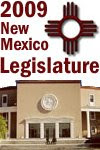 The Senate Public Affairs Committee gave a do-pass recommendation this evening to a bill that would open conference committees and other legislative meetings to the public.
The Senate Public Affairs Committee gave a do-pass recommendation this evening to a bill that would open conference committees and other legislative meetings to the public.
The question now: Will the unusual procedural move by Sen. Dede Feldman, D-Albuquerque, that made today’s vote possible be challenged or will the full Senate soon get a chance to vote on the proposal?
 Senate Bill 737 was approved on a vote of 7-0 this evening. The way the bill is scheduled now, that means it moves to the Senate floor.
Senate Bill 737 was approved on a vote of 7-0 this evening. The way the bill is scheduled now, that means it moves to the Senate floor.
But it was an unusual move that got the proposal to this point. Feldman replaced what’s called a “dummy bill” — one that contains no actual legislation but can be replaced with a committee substitute after the deadline for new legislation passes — with a mirror of House Bill 393, sponsored by Rep. Joseph Cervantes, D-Las Cruces. Cervantes’ bill has already passed the House.
 The mirror of his bill is what the committee approved tonight.
The mirror of his bill is what the committee approved tonight.
It’s common that, when dummy bills are replaced with actual legislation, they get reassigned to committees that would normally hear them. The dummy bill was assigned to the Public Affairs Committee because Feldman chairs it. But Cervantes’ bill and Feldman’s Senate Bill 150, another proposal to open conference committees, have been assigned to the Senate Rules Committee, where they have been languishing without even being scheduled for hearings.
That’s why, with time running short in the 60-day session, Feldman tried the unusual move in an attempt to force a floor vote on the proposal.
But, given what usually happens with dummy bills, it’s not unreasonable to think that Majority Leader Michael Sanchez, D-Belen, might try to move the new bill from the Senate floor to the Rules Committee.
We should know on Friday, when the bill is referred by the Public Affairs Committee to the Senate floor. That’s the point at which Sanchez or someone else could make a motion to move the bill.
Would anyone do that, knowing that they’d be accused of killing the bill and heavily criticized? Time will tell.
The history
Cervantes’ proposal has passed the House several times in the past, but the Senate has resisted opening conference committees. Twice in 2007 — the last time the conference committee proposal came before the Legislature — the Senate shot it down by one vote. Changes in the Senate’s makeup that resulted from last year’s election have many believing the bill will pass this year, if it can get to a Senate floor vote.
Many believe the Feldman and Cervantes bills are stalled in the Rules Committee because opponents don’t want to give the proposal that opportunity.
Conference committees are groups of usually of three House members and three Senate members who are tasked with reconciling differences between versions bills that have passed both chambers. In addition to opening their meetings to the public, the bill that passed tonight would open many other currently closed legislative meetings, including executive sessions of the House Appropriations and Finance Committee.
Exempted from having to open their meetings under the bill would be investigative or quasi-judicial meetings — such as impeachment proceedings — and political party caucus meetings.
